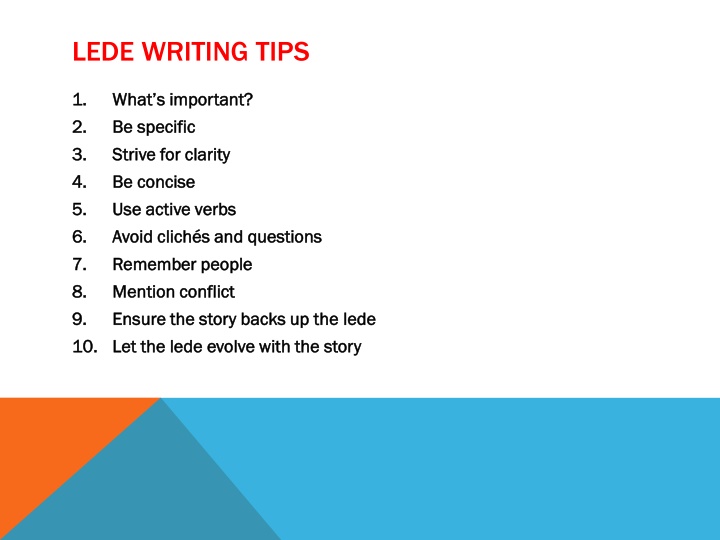
Mastering Writing Craft: Essential Tips and Style Guidelines
Enhance your writing skills with valuable tips on crafting a compelling lede, structuring the story process, and mastering style pointers like numbers, punctuation, and jargon. George Orwell's timeless rules for writing also offer insightful guidance. Elevate your writing to the next level by following these expert recommendations.
Download Presentation

Please find below an Image/Link to download the presentation.
The content on the website is provided AS IS for your information and personal use only. It may not be sold, licensed, or shared on other websites without obtaining consent from the author. If you encounter any issues during the download, it is possible that the publisher has removed the file from their server.
You are allowed to download the files provided on this website for personal or commercial use, subject to the condition that they are used lawfully. All files are the property of their respective owners.
The content on the website is provided AS IS for your information and personal use only. It may not be sold, licensed, or shared on other websites without obtaining consent from the author.
E N D
Presentation Transcript
LEDE WRITING TIPS 1. 1. 2. 2. 3. 3. 4. 4. 5. 5. 6. 6. 7. 7. 8. 8. 9. 9. 10. 10. Let the Let the lede What s important? What s important? Be specific Be specific Strive for clarity Strive for clarity Be concise Be concise Use active verbs Use active verbs Avoid clich s and questions Avoid clich s and questions Remember people Remember people Mention conflict Mention conflict Ensure the story backs up the Ensure the story backs up the lede lede evolve with the story evolve with the story lede
THE STORY PROCESS 1. 1. 2. 2. 3. 3. 4. 4. 5. 5. 6. 6. 7. 7. 8. 8. 9. 9. 10. 10. The idea The idea Research Research Questions Questions Interviews Interviews Sorting Sorting What is the story? What is the story? What will help tell the story? What will help tell the story? Flow Flow Fairness Fairness Accuracy Accuracy
SOME STYLE POINTERS NUMBERS NUMBERS Generally: one to nine in letters, 10 and above in numerals Generally: one to nine in letters, 10 and above in numerals But: 2 p.m. But: 2 p.m. 6,000 (not 6 000 or 6000) 6,000 (not 6 000 or 6000) It was founded Sept. 21, 1857, by avid curlers. It was founded Sept. 21, 1857, by avid curlers. He arrived in July 1942. He arrived in July 1942.
PUNCTUATION Justin Trudeau, the prime minister, arrived in the evening. Justin Trudeau, the prime minister, arrived in the evening. Prime Minister Justin Trudeau arrived in the evening. Prime Minister Justin Trudeau arrived in the evening. I was outraged, he said. I was outraged, he said. I was outraged that he told me, Mind your own business. I was outraged that he told me, Mind your own business. five five- -metre metre fence fence fully funded program (not fully fully funded program (not fully- -funded program) The Melville, Sask., athlete won a gold medal. The Melville, Sask., athlete won a gold medal. funded program)
JARGON ALERT Avoid acronyms Avoid acronyms If you are writing about the Big City Parks Committee, you If you are writing about the Big City Parks Committee, you you you can refer to it as the parks committee, or simply the committee, on can refer to it as the parks committee, or simply the committee, on second reference (not the BCPC). second reference (not the BCPC). Do not use clich s Do not use clich s Use plain language. Use plain language. For example: For example: Contact (not reach out) Contact (not reach out) Explain (not unpack) Explain (not unpack) Affect (not impact) Affect (not impact) Ease (not mitigate) Ease (not mitigate)
GEORGE ORWELLS SIX RULES FOR WRITING From From Politics and the English Language Politics and the English Language 1. 1. Never use a metaphor, simile, or other figure of speech which you are Never use a metaphor, simile, or other figure of speech which you are used to seeing in print. used to seeing in print. 2. 2. Never use a long word where a short one will do. Never use a long word where a short one will do. 3. 3. If it is possible to cut a word out, always cut it out. If it is possible to cut a word out, always cut it out. 4. 4. Never use the passive where you can use the active. Never use the passive where you can use the active. 5. 5. Never use a foreign phrase, a scientific word, or a jargon word if you can Never use a foreign phrase, a scientific word, or a jargon word if you can think of an everyday English equivalent. think of an everyday English equivalent. 6. 6. Break any of these rules sooner than say anything outright barbarous Break any of these rules sooner than say anything outright barbarous. .
